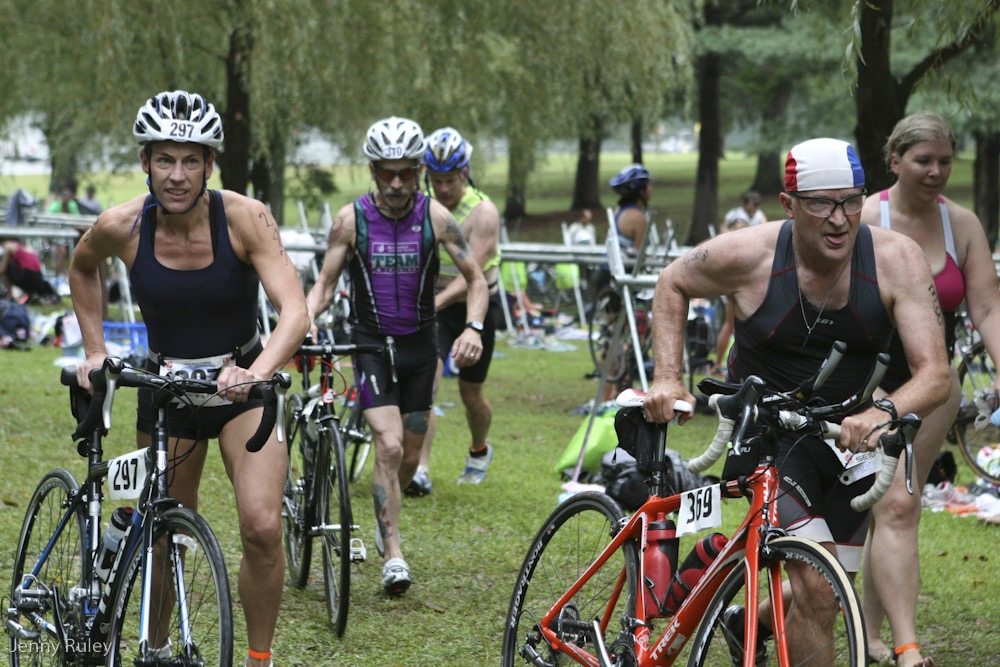Triathlon Preparation Fundamentals
You’ve signed up for your first triathlon. Now that you’ve committed, the race becomes real. It’s no longer, “Some day…”
When I entered my first sprint triathlon at Atlantic Beach in Florida in 1995, I had no idea what to expect on race day. My only experience with triathlon was watching clips of the IRONMAN Triathlon in Hawaii on TV.
On race morning, I was nervous and kept looking at the other athletes to see how they set up their transition areas. Why did they have towels and buckets? I knew I could each of the distances in swim, bike and run because I had done them in training but never performed them back-to-back-to-back in training. I didn’t understand the importance of BRICK workouts in training until the start of the run when my legs felt like bricks and the other athletes passed me on what I thought was my strongest sport. Still, I managed to finish.
Training for a triathlon obviously requires physical training in three different sports – swim, bike and run – but there are fundamental considerations to preparing for the sport that many athletes neglect.
Here are 3 fundamental preparation tips for your first (or next) triathlon:
- Learn About the Sport
- Build Confidence Through Preparation
- Don’t Take Yourself Too Seriously
1. Learn About the Sport
Go watch a race from start to finish, or, better yet, volunteer at a race. See what the other athletes do. Ask questions. As a fall back, there are many videos on YouTube showing clips from races.
As a race director, it amazed me how many athletes – even experienced athletes – didn’t know the basic rules of triathlon like:
- No drafting (keep back more than 3 bike lengths from the rider in front of you),
- Always ride on the right side of the road and pass on the left and
- Wear and bucket your helmet prior to riding your bike (this includes before and after the race at the race site, too).
USA Triathlon has a number of free resources on their website explaining rules and providing tips for new triathletes.
2. Build Confidence Through Preparation
Confidence can be defined as, “a feeling of self-assurance arising from one’s appreciation of one’s own abilities or qualities.” In other words, you have the belief that you can achieve the finish line of your triathlon.
Following a consistent, purposeful training program will give you the confidence that you can achieve the finish line. If you don’t have access to a coach or training group, training plans are an excellent option, especially if you do most of your training by yourself.
Practice your transitions. The transitions between swim to bike and bike to run count towards your total finish time. Even if you are a slow swimmer, bike and run, you can still transition fast with practice.
Don’t forget the BRICK workouts (bike workouts followed immediately by a short run to get your legs used to transition from bike to run in a race).
3. Too Don’t Take Yourself Too Seriously
Triathlon a sport and meant to be fun. You may start the run with your bike helmet still on or forget the sunscreen and get sunburned. I would often forget my energy gels in transition so I didn’t have them on the bike.
Ah, well. It’s good to make mistakes and learn from them. Just smile and keep going…
Happy training,
David
—
Coach David B. Glover, MS, CSCS has completed 28 IRONMAN distance triathlons including two sub 9 hour finishes and winning Vineman Full twice. Now, David’s passion now is helping triathlete and other endurance athletes achieve their dreams through his online triathlon education and training company, ENDURANCEWORKS. David has an MS in Exercise Physiology and is certified as a coach by USA Triathlon and USA Cycling as well as having his CSCS from NSCA. After six years of living, training and coaching in the triathlon mecca of Boulder, CO, David currently resides in Southern California.


